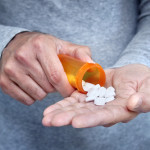Nothing makes you feel healthy like fun in the sun. Running on the beach. Cycling in the park. A spirited volleyball game. A Frisbee toss. The great outdoors turn a high-energy workout into good old-fashioned play. What could be better?
“As a morale booster, outside exercise works like magic,” says Paul Esposito, a former personal-fitness trainer. Age 33, HIV positive and in peak condition, Esposito looks like he’s spent most of his life in a gym or poolside. “For someone with HIV in stable health, virtually every outdoor activity -- in moderation -- is good,” he says. “But watch out for dehydration.”
Stealthy, speedy and dangerous, dehydration can shut down your kidneys or throw you into a coma after only a few hours of activity -- if you don’t take precautions. Think of dehydration like sunburn, another summertime menace. Any sane person wears sunscreen to protect against the painful burn, the unsightly wrinkles, even melanoma. It’s a must. And lying on the beach or working in the garden, who hasn’t sensed the sudden slap of the sun? But by the time you feel the burn, the damage is done.
The same is true of dehydration. Heat and exertion make you sweat -- it’s the body’s natural cooling mechanism. And by the time you’re really sweating -- and thirsty -- dehydration may have set in. Why? Exercise raises your body temperature, putting stress on your cardiovascular system. Your heart pumps harder, your muscles get weaker, you have dry mouth, fatigue, depression. Now heat exhaustion threatens. Without medical attention, dehydration can lead to disability or even death.
Lisa Ellison, a 39-year-old HIV positive tennis fanatic, woke up in the ER after what had started out as a lively afternoon of tennis. “I played for three hours in the middle of the day. I felt fine until the last set, when my body suddenly began to shake. Then I got dizzy and threw up. A few minutes later I was unconscious in an ambulance.” Ellison was lucky -- she needed only a few liters of IV fluids and a night in the hospital. Her kidneys started up again, and she had no lasting damage.
Dr. Beverly Shapiro, a Philadelphia chronic-illness specialist, warns that since people tend not to drink enough in general, they fail to increase their intake sufficiently during exercise until they feel thirsty. Too late. “I tell my patients to view exercise as a long car trip,” she says. “You fill the gas tank before you take off, not when the car starts to sputter out on the freeway.” Shapiro adds that many AIDS meds can “alter body chemistry so you don’t sweat as easily. That makes your body temperature rise even higher and puts you at greater risk.” And people using hard-on-the-kidneys Crixivan must take special care to drink more than the daily 48-ounce minimum of water; a day at the beach or a too-strenuous workout can cause kidney stones.
Nick Baker, 34, HIV positive and a self-described “cycling nut,” learned the hard way. “I never knew how dangerous dehydration could be,” says Baker, who set out on the California AIDS Ride last fall and, after heatstroke on the second day, landed in the hospital for a week. “I thought I was drinking enough fluids. But when I got to the hospital my temperature was almost 105 and I was going into a coma.”
Staving off dehydration is simple. Christine Hannema, MS, RD, an HIV nutrition specialist at Gay Men’s Health Crisis, offers this advice. For an hour-or-less workout, plain old H2O is best. But if you’re sweating long and hard, add a sports drink with a low-percent glucose solution -- a detail Baker overlooked. (Drinks with caffeine or alcohol don’t count as fluids -- they’re natural diuretics.) When to drink? Two cups (16 ounces) of cool water one to two hours ahead of time, another 8 to 16 ounces 15 minutes before you start and 4 to 6 ounces every 10 to 15 minutes while playing. Keep replenishing fluids for three hours after you’ve quit.
“Thirst is easily satisfied, and it shuts off fast. But don’t confuse ’I’m no longer thirsty’ with ’I’ve rehydrated my body,’” Hannema says. “Keep drinking. Go crazy! No one ever drowned from drinking too much.” Hannema likes her clients to weigh themselves before and after their workout, replacing each lost pound with that much water. Or put your urine to use: If it’s transparent (after noon) and discharging at regular intervals, water intake’s sufficient. So drink up, have fun, and your only visit to the ER will be via the TV Thursday nights.






Comments
Comments